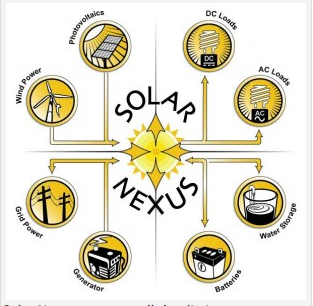In rural Africa, over 90 percent of people do not have access to electricity. To address this problem, Solar Nexus International (SNI) has designed a contained system of solar power generation that can be installed relatively quickly and easily.

The heart of this operation is the SolarNexus, a small device that links wires, transformers, converters, inverters, and batteries required in an off-grid electricity system. Through this device, Solar Nexus hopes to fulfill its mission for “solar empowerment through market-based development of local solar energy resources worldwide.”
Typically, it takes a fair amount of knowledge and training to set up an electricity generating system. Whether solar, hydropower, or wind, transforming captured energy into useful electricity requires a variety of different hardware, not always available in developing countries. If any of this hardware is improperly installed, or if wires are not the proper size, the efficiency of the system suffers severely. When these systems are installed in developing countries, high-grade wires are usually not used because they are too expensive or not available, and as a result less electricity is available for use. In order to overcome this problem, Solar Nexus International custom-designs a system for each client, and then ships out a container that includes all the wires and materials needed for a U.S. code-compliant system. Once the shipment is received, the provided instructions allow local electricians to install the system. As a result of high quality and correctly sized wiring and components, communities will be able to get as much energy as possible from the unit, sacrificing nothing to poor wiring.
In order to support the mission of empowerment and market-based development, SNI has worked with local non-governmental organizations to provide educational opportunities to interested parties. Farmers’ groups, women’s collectives, missionary groups, and anyone desiring solar power can work with the organization to gain the knowledge and experience necessary to maintain their systems and begin selling other solar products to their community. Once they have completed the training program, these students begin selling micro-solar systems or products, such as lamps, radios, small appliances and toys. SNI provides all the materials necessary to start a micro-warehouse, to store products for eventual sale in the community. Not only does this provide electricity at a reasonable price, but also begins building the ability of rural populations to enter the market and start businesses of their own.
This also creates economic opportunities for women farmers. Instead of being forced to collect firewood for cooking, heating and lighting, they have the free time to pursue other activities, including crafts and value added products to help them earn additional income. Also, SolarNexus and a solar power system can allow them to recharge their cell phones which are becoming an increasingly valuable farm tool, and mechanize processes like milling grains.
By Philip Newell

Danielle Nierenberg, an expert on livestock and sustainability, currently serves as Project Director of State of World 2011 for the Worldwatch Institute, a Washington, DC-based environmental think tank. Her knowledge of factory farming and its global spread and sustainable agriculture has been cited widely in the New York Times Magazine, the International Herald Tribune, the Washington Post, and
other publications.
Danielle worked for two years as a Peace Corps volunteer in the Dominican Republic. She is currently traveling across Africa looking at innovations that are working to alleviate hunger and poverty and blogging everyday at Worldwatch Institute’s Nourishing the Planet. She has a regular column with the Mail & Guardian, the Kansas City Star, and the Huffington Post and her writing was been featured in newspapers across Africa including the Cape Town Argus, the Zambia Daily Mail, Coast Week (Kenya), and other African publications. She holds an M.S. in agriculture, food, and environment from Tufts University and a B.A. in environmental policy from Monmouth College.








